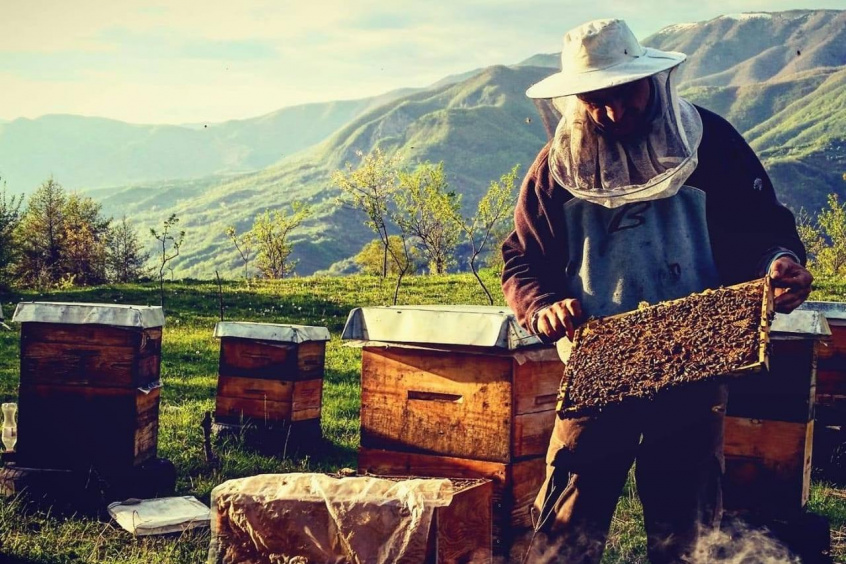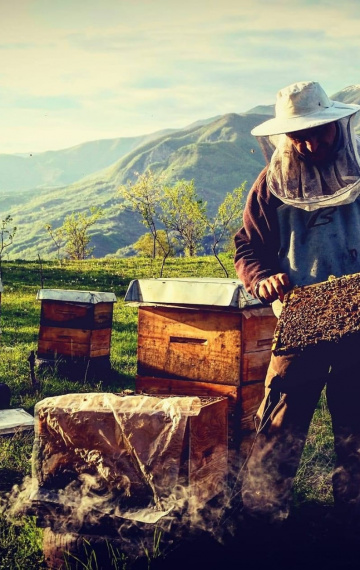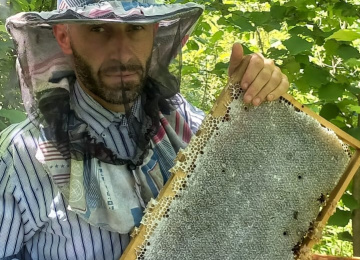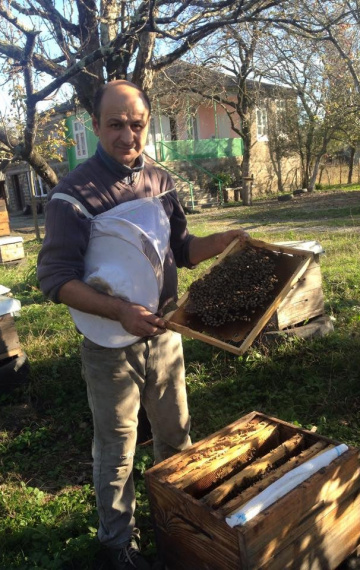
Beekeeping has a rich history in Georgia, with archaeological evidence indicating that honey production dates back over 7,000 years. In the western part of the country, local beekeepers have transformed their lifelong passion into scalable enterprises, thanks to modern equipment and infrastructure upgrades funded by the European Union through its EU4Business Initiative.
Over two decades ago, Giorgi Lakvekheliani from Patara Jikhaishi in the Imereti region of western Georgia received a gift from his neighbour – a colony of bees. At the time, Lakvekheliani, then in his early thirties, knew little about beekeeping, and the bees unfortunately didn’t survive. Feeling responsible, the neighbour – a well-known Georgian beekeeper – took it upon himself to teach Lakvekheliani the art of beekeeping.
“This decision defined the next 20 years of my life,” Lakvekheliani explains. “We built the entire chain of honey production from scratch.”
Over the years, Lakvekheliani and his two sons, now in their late twenties, have become skilled professional beekeepers. They previously produced up to five tons of honey each year, selling their products to shops across western Georgia. Although success led to increased honey production, it also brought a more demanding workload to the Lakvekheliani family.
Hand-extracting honey is a labour-intensive process that requires using a thin knife, which must be kept warm at all times by frequently dipping it in warm water during the process. Lakvekheliani and his sons had to remove the honeycombs from the hive, brush off any remaining bees, and then use the warm knife to cut away the wax caps sealing in the honey. The process took considerable time and energy.
Fortunately, Lakvekheliani received a grant under the Capacitated Agricultural Practices and Consumer Awareness (CAPCA) project, funded by the European Neighbourhood Programme for Agriculture and Rural Development in Georgia (ENPARD – Georgia). The project seeks to enhance food safety practices within the dairy and beekeeping industries, improve compliance with food safety standards, foster stakeholder engagement for alignment with Georgia’s Deep and Comprehensive Free Trade Area (DCFTA) agreement with the European Union, and increase consumer awareness of food safety regulations and consumer rights. Within the framework of the project, beneficiaries implemented Geo Gap - a local standard for the primary production of agricultural products (fruits and vegetables).
For Lakvekheliani and his family, the new equipment reduced the need for manual labour. A honey extractor uses centrifugal force to extract honey, but first, the honey has to be strained to remove any residue left by the bees. To do this, Lakvekheliani purchased a straining device. Additionally, they acquired a press that separates the honey from the wax through compression, as well as a homogenizer – a device designed to create a uniform, consistent honey.
"Thanks to the new equipment, we now produce between five and 15 tons of honey each year, whereas before, we could only produce up to five tons," Lakvekheliani says. “It motivated us to work harder.”
The Lakvekheliani family now has the necessary resources and infrastructure to take the next step in expanding their business, potentially into retail. However, they first need to learn about inventory control, pricing strategies, marketing techniques to attract customers, retail regulations, and supply chain logistics.
"That's what development looks like for us,” Lakvekheliani says. “Creating your own brand is the first step, but the real challenge lies in leading it.”
Lakvekheliani’s story echoes that of fellow beekeeper Giorgi Benidze – although he was only 12 years old when his beekeeping career began.
It all started when a guest at the Benidze home said he had lost a bee colony. The young boy tracked down the bees and brought them back home. So impressed was the guest by the boy’s efforts, he told him he could keep the bees.
“Decades later, I now manage around 200 bee colonies and produce up to five tons of honey annually,” Benidze says, although he notes that the work comes with multiple challenges.
Benidze lives in the village of Gumati, located in the Imereti region of western Georgia, an area characterized by its humid climate, particularly during the warmer months. Without proper humidity control, honey, which naturally absorbs moisture from the air, risks losing its quality and spoiling. This issue is exacerbated when honey extraction takes several days, as prolonged exposure to humid conditions can lead to degradation.
Benidze also frequently faced problems with faulty electrical wiring, which caused equipment failures such as burned-out motors and malfunctioning components. This disrupted his operations and increased maintenance costs.
To address these challenges, Benidze, similarly to Lakvekheliani, applied for and received a grant under the CAPCA project, funded by ENPARD – Georgia. With the necessary funds in place, he purchased a dehumidifier that effectively draws moisture from the air and collects it in a reservoir, maintaining optimal humidity levels and preserving the honey's quality.
In addition, he bought a high-performance homogenizer – a large tank equipped with both heating and stirring functions. “For instance, if I have three tons of honey, I can use the homogenizer to blend them into a uniform product,” Benidze explains. “Since honey can vary in colour and taste, ensuring consistency is crucial for meeting client expectations. A single, standardized honey type is especially important for sampling and taste evaluation.”
Benidze also invested in solar panels to solve the issue of faulty wiring. The panels stabilize the current, protect equipment from damage, and reduce costs – while also storing electricity when the honey-making equipment is not in use.
With improved equipment and increased honey production, Benidze aims to expand his business beyond Georgia. He is currently awaiting permanent certification from the National Food Agency (NFA), which would allow him to legally bottle honey, distribute it, and begin exporting.




